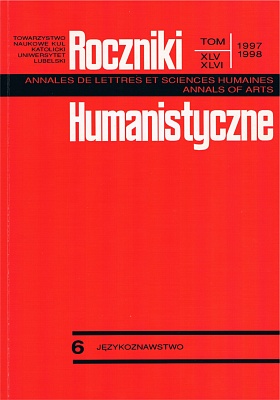The Language of the Pastoral Letter of Metropolitan Bishop A. Szeptycki in View of the Ukrainian Literary Language of Galicia before World War One
Abstract
The paper seeks to analyze the language of the pastoral letter of Metropolitan Bishop A. Szeptycki in view of the Ukrainian literary language of Galicia before World War One.
The Bishop of Lvov have earned many divergent evaluations in the consciousness of Poles, Ukrainians, Byelorussians, and Russians. Only objective scientific research may unveil a true image of his thoughts and deeds. A. Szeptycki was only a theologian and philosopher, but also an outstanding writer in his times.
The pastoral letters of the Metropolitan complete his lifetime and pastoral activity, and prove his literary talent. They embrace the greater part of the Bishop's literary output. Their form draw on to the pastoral letters of the Apostles, and are addressed, above all, to the clergy. The letters were often inspired by the moment of the liturgical year, as well as by some significant social events.
It is worth noting how Szeptycki wrote his letters, and it is worth stressing the general regularity of his interpretation, argumentation, and the manner in which he concluded each letter. His words are powerful and expressive, and his statements well-chosen.
The style of those letters may be defined as popular. It is characterized by the following attributes: simplicity, practicality, minimal number of abstract expressions, general and purely theoretical concepts.
The linguistic part of the pastoral letters reflects to an extent the then circumstances of the Ukrainian language used in Galicia before World War One. Each writer adjusts himself to the extant linguistic-stylistic norms. Obviously, Szeptycki's language, like the language of each writer, his its individual features. The largest number of elements which make his language and style different from others are found in the Metropolitan's vocabulary, especially religious vocabulary, a fact which is comprehensible owing to the contents and character of the letters.
The characteristic elements of the Metropolitan's pastoral letters are quotations from the Scripture. He quotes them in the Old Church Slavonic language.
Apart from religious terminology, which is the underlying basis, there is colloquial vocabulary and phraseology in the letters.
What is peculiar about the pastoral letters is their great number of Polonisms, Old Church Slavonic elements, dialect and archaic forms.
As regards phonetics, morphology and syntax one can notice in the writings of Szeptycki some tendencies characteristic of the Ukrainian literary language in the then Galicia. They were printed according to the principles of etymological spelling which was considerably different from phonetic spelling. Szeptycki wrote as everybody else in that period, yet what distinguishes his pastoral letters was his application of religious terminology.
As the Ukrainian literary language developed in Galicia and the norms of spelling were made uniform, the Ukrainian language which the Metropolitan used changed to an extent as well.
Copyright (c) 1997 Roczniki Humanistyczne

This work is licensed under a Creative Commons Attribution-NonCommercial-NoDerivatives 4.0 International License.





